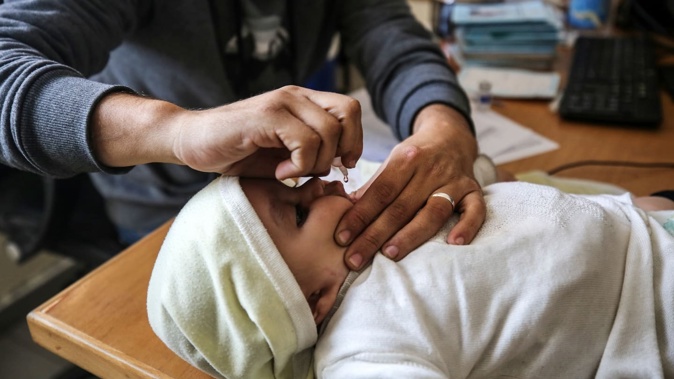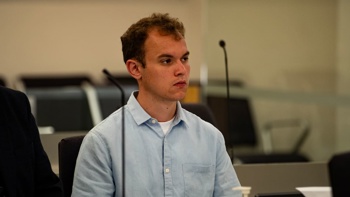
Adel Abu Obeida stays awake at night trying to protect his six children from the sewage, insects and rodents that creep into their family tent in the central Gaza Strip. At sunrise, he lines up at a nearby distribution point for 3.7l of water he fears is contaminated.
Last month, his toddler Mohammed caught what doctors said was chickenpox, a highly contagious disease that, in normal times, could be prevented with a simple vaccine.
It is a “health disaster,” Abu Obeida, 43, said by phone from Deir al-Balah, where his family is displaced. “We literally live in a large swamp of sewage.”
Packed into squalid tent camps and apartment buildings in Gaza, where Israel’s war against Hamas has levelled health and sanitation infrastructure, Palestinians are being overwhelmed by sickness. A lack of soap, potable water, clean clothes and access to toilets among the displaced means hepatitis A and other communicable diseases are on the rise. Doctors have also recorded likely cases of scabies, mumps, measles and meningitis, according to health-care workers and a United Nations disease surveillance database.
Now, the World Health Organisation has warned that poliovirus is probably spreading in Gaza, after a vaccine-derived variant was detected last month in six sewage samples in the southern and central regions. “The detection of polio in wastewater in Gaza is a tell-tale sign that the virus has been circulating in the community, putting unvaccinated children at risk,” WHO Director-General Tedros Adhanom Ghebreyesus said last week on X.
The WHO and other relief organisations have consistently called for an immediate cease-fire between Israel and Hamas to address the worsening humanitarian crisis in Gaza, including the spread of disease. But talks to end the war and secure the release of Israeli hostages have been stalled for months, and this week, the United States, Qatar and Egypt are making a last-minute push to salvage what they hope is a final round of negotiations scheduled for Thursday.
Washington is urging Israel to agree to the terms of the proposed agreement without inserting new demands and refrain from more aggressive military actions that could disrupt the talks.
“What you need is a cease-fire, preferably,” Rik Peeperkorn, the WHO representative for the West Bank and Gaza, said of any efforts to address the public health emergency and prevent polio from circulating. Or, at a minimum, the parties should agree to “days of tranquillity” to ensure that healthcare workers and aid organisations can move freely, he said.
Poliovirus is spread through contaminated food or water, as well as contact with infected faeces. In the most severe cases, it can cause paralysis, trouble breathing and even death, including in children, who are the most vulnerable to the disease. It’s been eradicated across much of the world, and before the war, Gaza’s polio vaccination rate was 99%, in a population of 2.2 million, according to the WHO.
But the conflict, mass displacement and breakdown of the healthcare system have all caused polio vaccination coverage to drop to 86%, the WHO said. Though no clinical cases have yet been recorded, Tedros said his organisation is sending more than 1 million vaccines to Gaza to try to step up immunisations, even as fighting continues and aid agencies struggle to distribute relief.
Last month, Israel began offering preventive polio boosters to soldiers deployed to Gaza, but a wartime vaccination drive would be much more difficult and require extensive “micro-planning”, said Peeperkorn.
A successful campaign would entail not just getting shots into Gaza but ensuring temperature-controlled storage, training healthcare workers and safely organising immunisation sites, he explained.
In February, epidemiologists at the London School of Hygiene and Tropical Medicine and the Johns Hopkins Centre for Humanitarian Health projected that potential outbreaks of infectious diseases, such as cholera, polio, measles and meningitis, could cause thousands of excess deaths in Gaza and linger long after the war ends.
Ten months of Israeli airstrikes and ground fighting have damaged or destroyed water pipelines, desalination plants, reservoirs and sewage treatment facilities, according to the UN Environment Programme
Gaza’s “water, sanitation, and hygiene systems are almost entirely defunct”, UNEP said in June in a preliminary report on the war’s toll on human health. “Gaza’s five wastewater treatment plants have shut down,” it said, “with sewage contaminating beaches, coastal waters, soil, and freshwater with a host of pathogens.”
In Gaza City alone, damage to sewage management systems is so extensive that it could take up to a year to fix even if fighting were to stop and reconstruction materials were allowed in, according to Mohammed Emam, director of the city’s wastewater department.
In the meantime, “it’s really hard to establish or reestablish the [sanitation] system while violence is ongoing”, Salim Oweis, a communications officer for Unicef, the UN children’s agency, said by phone from Gaza. “Because that means that it can, at any point, get destroyed.”
Kari Thabet, who lives in a house in Deir al-Balah with 40 other people, says she tries to avoid the sewage that courses through the streets. But her three children are among at least 14 people in the house who have contracted hepatitis A, she said. Thabet, 40, knew something was wrong when they began acting listless and their faces turned pale.
“People fill their drinking water from the same place where the polluted water and sewage leak,” she said, adding that children now play in the mounds of garbage that have piled up between tents and pick through them for scraps of food.
Most parents cannot afford to maintain basic hygiene. Amid widespread shortages, a bar of soap costs $13 in Deir al-Balah, residents say; a bottle of shampoo is $32.
According to the UN surveillance database, more than 100,000 cases of acute jaundice syndrome – or suspected hepatitis A – have been reported in Gaza since the start of the war. The UN Relief and Works Agency for Palestinian refugees said this month that 40,000 cases had been reported in its shelters and clinics since October, compared with just 85 cases over the same period before the war.
The figures represent “a frightening increase,” said UNRWA chief Philippe Lazzarini.
At least 39,929 people have been killed in Gaza since the start of the conflict, according to the local health ministry, which does not distinguish between civilians and combatants but says the majority of the dead are women and children. Yet the available numbers fail to capture the scale of the health crisis, according to Peeperkorn, who said that the spread of infectious diseases is “underreported” because of a lack of tests and access to medical care. War wounds go untreated, raising infection risks.
At a bare-bones clinic in Mawasi in southern Gaza, where Israel has ordered civilians to congregate in an ever-shrinking “humanitarian area”, paediatrician Raed al-Baba says he sees more than 120 patients every day with preventable illnesses – children covered in rashes and open sores, and whole families with scabies or hepatitis A. Earlier this month, he said, he treated a child with vision problems caused by meningitis.
More than 300 suspected cases of meningitis, which can be deadly if left untreated, have been recorded since October, according to the WHO.
The spread of disease is putting serious strain on already meagre supplies of medicine. Baba says it pains him to have to ration creams and ointments.
Among his patients is Salwa, a 1-and-a-half-year-old whose face is covered in a red rash and sores, according to a photo provided by her mother, Reem Abu Daher.
Abu Daher, 33, who has been displaced seven times since the war began, is currently in a tent camp in eastern Khan Younis. The mother is doing her best to treat Salwa, the youngest of her three girls, and to keep her skin infection from spreading.
“We tried to create a small bathroom made of some pieces of cloth and zinc sheets to prevent us from mixing with others, but to no avail,” she said.
Abu Obeida says he is relying on donated wet wipes to treat his son’s chickenpox.
“What scares me most is losing any of my family members,” he said, “who, if they don’t die in the bombing, will die of serious, fatal diseases.”
-Miriam Berger, Hajar Harb of the Washington Post
Take your Radio, Podcasts and Music with you









